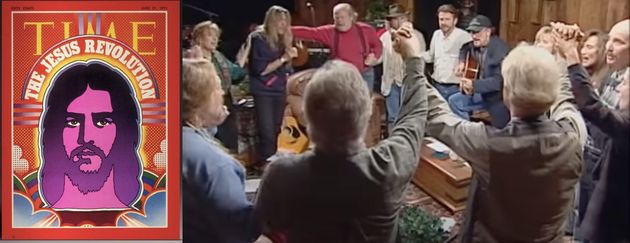TIME Magazine coined the phrase ‘Jesus Revolution’ to describe the sudden surge in young people turning to the Christian faith in the ’70s.
![Love Inn Community today in Freeville, New York. / [link]Covenant Love Community Church[/link]](https://cms.evangelicalfocus.com/upload/imagenes/64ac2370a7151_lovinn.jpg) Love Inn Community today in Freeville, New York. / [link]Covenant Love Community Church[/link]
Love Inn Community today in Freeville, New York. / [link]Covenant Love Community Church[/link]
Few worship leaders today are old enough to remember a time when ‘contemporary worship’ did not yet exist.
A visit last week from Steve and Marie Goode, old colleagues whom I first met in 1974 before I joined YWAM, took me back to my own exposure to the pioneers of that new genre in a long tradition of Christian music.
Our conversation led to a recent video where some of the leading names in the development of contemporary American worship gathered in a three-day retreat to reflect, worship and remember their ‘first love’.
As I watched those worshipping together around the Californian mountain cabin with songs of almost 50 years ago, I realised that I had had the privilege of meeting many of them at some stage: including Chuck Girard, Barry McGuire, 2nd Chapter of Acts (siblings Annie Herring, Nelly Greisen and Matthew Ward), Jimmy and Carol Owens, and Melody Green (widow of Keith).
The video took me back to a rural barn I visited in Upper New York State in 1974 when living in Toronto.
At the time I was managing a company of singers, dancers and musicians called Shekinah, led by Merv and Merla Watson, who had a prominent role in the renewal then happening in Toronto.
The company had earlier performed in that barn where on this occasion resident musicians Phil Keaggy and Ted Sandquist (‘Lion of Judah’) were jamming together with 2nd Chapter of Acts and their band.
[destacate] Few worship leaders today are old enough to remember a time when ‘contemporary worship’ did not yet exist [/destacate]This was the Love Inn Community in the town of Freeville, led by radio gospel jockey Scott Ross. When our carload of young people had stopped at the Canada-US border at Niagara Falls and given our destination as ‘Love Inn, Freeville’, the police decided to ransack our car looking for drugs.
Many at Love Inn probably had used drugs at some stage of their lives, but now it was an iconic Jesus Movement community composed of artists, musicians and others from the entertainment world.
A front page article in the NY Times in 1971 had described the Love Inn commune as ‘Jesus People, part of a nationwide movement of youths who are “turning on to Jesus” and dressing up the old‐time religion in hippie garb.’
That same year, TIME Magazine coined the phrase ‘Jesus Revolution’ to describe the sudden surge in young people turning to the Christian faith in the ’70s, first in California, then spreading across America and around the world.
‘Jesus is alive and well and living in the radical spiritual fervor of a growing number of young Americans who have proclaimed an extraordinary religious revolution in his name,’ the magazine reported.
‘There is an uncommon morning freshness to this movement, a buoyant atmosphere of hope and love.’
Just three years earlier, in my native New Zealand, my brother and I had been asked by a couple in their early thirties, David and Dale Garratt, to help record scripture verses put to music.
Many today regard the ministry of the Garratts as one of the main springs of the global worship movement emerging in the 1970s.
Worship, singing in prayerful expectancy to rather than just about God, became a hallmark of the nascent charismatic movement in New Zealand.
Through the Garratts’ travel and the vehicle of overseas visitors, this worship emphasis spread to Australia, South Africa, the United States and Britain.

Barry McGuire was one such visitor to New Zealand, whom I met there in 1973 (in red sweater and suspenders in photo above).
Famous for his 1965 global protest hit, ‘Eve of Destruction’, and actor in the 1968 Broadway hit ‘Hair’, he became a believer in 1971 through evangelist Arthur Blessitt, and would become a pioneer of contemporary Christian music.
The same year I visited Love Inn, I toured through England with the 60-strong Shekinah Company holding worship events in cathedrals and other venues (including Trafalgar Square) from York to Portsmouth, before crossing the channel to prepare for two more weeks in Holland.
One thing our organisers in both countries did not know how to handle was dance. Christians did not dance, and certainly did not worship through dance.
However, the Shekinah tour in both England and Holland reminded the audiences of King David’s example (2 Samuel 6:14) and his instruction to ‘praise him with dance’ (Psalms 149 & 150).
On the subsequent tour in Holland, at our concert in the famous Westerkerk in Amsterdam, I was to meet Floyd McClung who was living at the time on a houseboat called The Ark, moored behind Amsterdam Central Station.
That encounter would lead me to move to The Netherlands, where I would witness the next chapter in the development of the worship movement in Europe.
Jeff Fountain, Director of the Schuman Centre for European Studies. This article was first published on the author's blog, Weekly Word.

Las opiniones vertidas por nuestros colaboradores se realizan a nivel personal, pudiendo coincidir o no con la postura de la dirección de Protestante Digital.
Si quieres comentar o